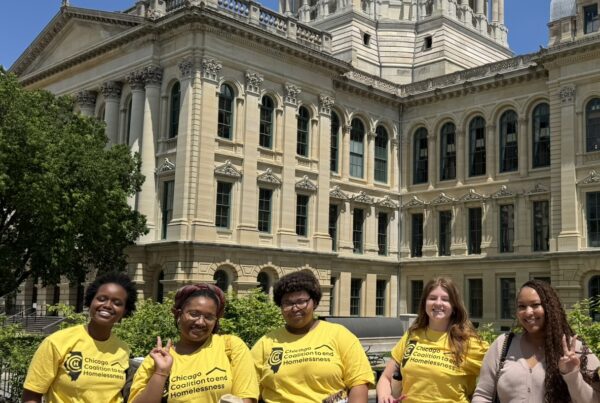Keith Freeman often tells the homeless people he meets, “It’s not where you’re from but where you’re at.”
Tough circumstances leave many of the men and women he meets feeling hopeless. But having overcome homelessness himself, Keith knows life can get better when opportunities are available to those struggling without a home.

Organizer Keith Freeman with leaders, Labor Day 2017 (Photo by Allison Williams)
Keith works as a community organizer for the Chicago Coalition for the Homeless (CCH). Each month he runs outreach at a dozen shelters serving parents and families. He educates people on their rights and options and organizes new leaders for a citywide CCH campaign now in development.
He works with leaders like April and Gregory Harris.
The Harrises fled Pennsylvania several years ago with their two children, after street gangs began to menace their neighborhood. They have a limited income, surviving on Supplemental Security Income (SSI) because of chronic health issues – Greg has multiple sclerosis and April is bipolar. Their family found shelter at the Single Room Housing Assistance Corporation (SRHAC).
Keith organized with April, who helped him mobilize people for the Fight for $15. That included a rally last Labor Day when April helped him pack a bus with people who support a $15 minimum wage.
“We need to get things done here,” said April. “We won’t be discarded because we’re homeless.”
Keith, 52, knows the frustration of feeling voiceless. Thirteen years ago he was moving from shelter to shelter, struggling with addiction. His future was uncertain.
“Nothing in my past influenced me to do this work,” Keith said of community organizing. “I didn’t see this lifestyle coming since I was so different before.”
Raised in Englewood, Keith saw drug use, dealers and gangs in his neighborhood. But focused on athletics while attending Chicago Vocational High School, Keith earned a baseball scholarship to Jackson State University in Mississippi. He finished all but his last semester before dropping out.
“I didn’t know what addiction was until college,” he said. “My need was progressive. It was a social thing at first.”
Addiction later triggered homelessness that lasted 11 years. Keith says he disregarded any help until he feared losing his life to addiction.
An opportunity to change came when CCH’s Wayne Richard, now director of organizing, ran outreach at his shelter. “Wayne called me out about a lot of stuff. He was talking to me about shared traumatic, painful experiences we’d had. He passed the torch to me and I want to pass the torch to someone else,” Keith said.
Encouraged by Wayne, Keith joined a Fair Trade coffee project that CCH ran for several years. He would explain CCH to shoppers at downtown farmers markets, selling a record $11,000 in coffee during the summer of 2006. He remained an active leader for over a year, participating in the (Health) Care for All and big box store living wage campaigns.
“CCH organizers taught me about tapping into my power and theirs, instead of feeling powerless. Organizing was therapeutic. I started thinking about strategy,” he recalled.
Keith left CCH after landing a position as a senior job developer for hard-to-place workers. Through the years, he stayed in touch with the organizing staff. After long-time organizer Dollie Brewer retired, he was invited to join the CCH organizing staff in May 2016. Since then, Keith has told his story to hundreds of homeless people living in shelters across Chicago.

In May, CCH’s Keith Freeman with European organizing fellows Zsuzsa Berecz and Ivana Novakova, and a Breakthrough Ministries staffer
“Keith makes it personal,” said Martin Coffer, Associate Director of Breakthrough Urban Ministries Men’s Services. “He comes in with that lived experienced and encourages the men at our shelter. Some of the men have attended community organizer training and helped staff understand the fight. They see they can have a voice for policy and that power won’t just be handed to them.”
Breakthrough residents have participated in Fight for $15 rallies and advocated in Springfield for affordable housing funds in the state budget. Resident Andon Kostov is one of the leaders Keith has recruited to participate in CCH’s three-day organizer training.
“There’s a lot of homeless people who need help,” Andon said. “I’m interested in the organizing work Keith does and how he gets his voice across. I have a story that I can share, too, and they showed me how to do it.”
SRHAC program manager Sean Williams credits Keith with helping place nine families into their own apartments by providing information on Families in Transition (FIT), a school-based program that CCH helped city officials launch last fall.
“Keith has been a great help,” Sean said. “He has dropped off supplies and keeps me up on [CCH-advocated] legislation, like getting free birth certificates. He communicates every day and offers programs for clients to participate in.”
Telling your story and sharing your time – for Keith, that’s the most constructive way of organizing.
“We have to tell our stories, build relationships, and talk more freely,” Keith said. “It isn’t the same journey for everyone, but you have to stay connected. I do that every day.”
– Cydney Salvador & Anne Bowhay, Media






